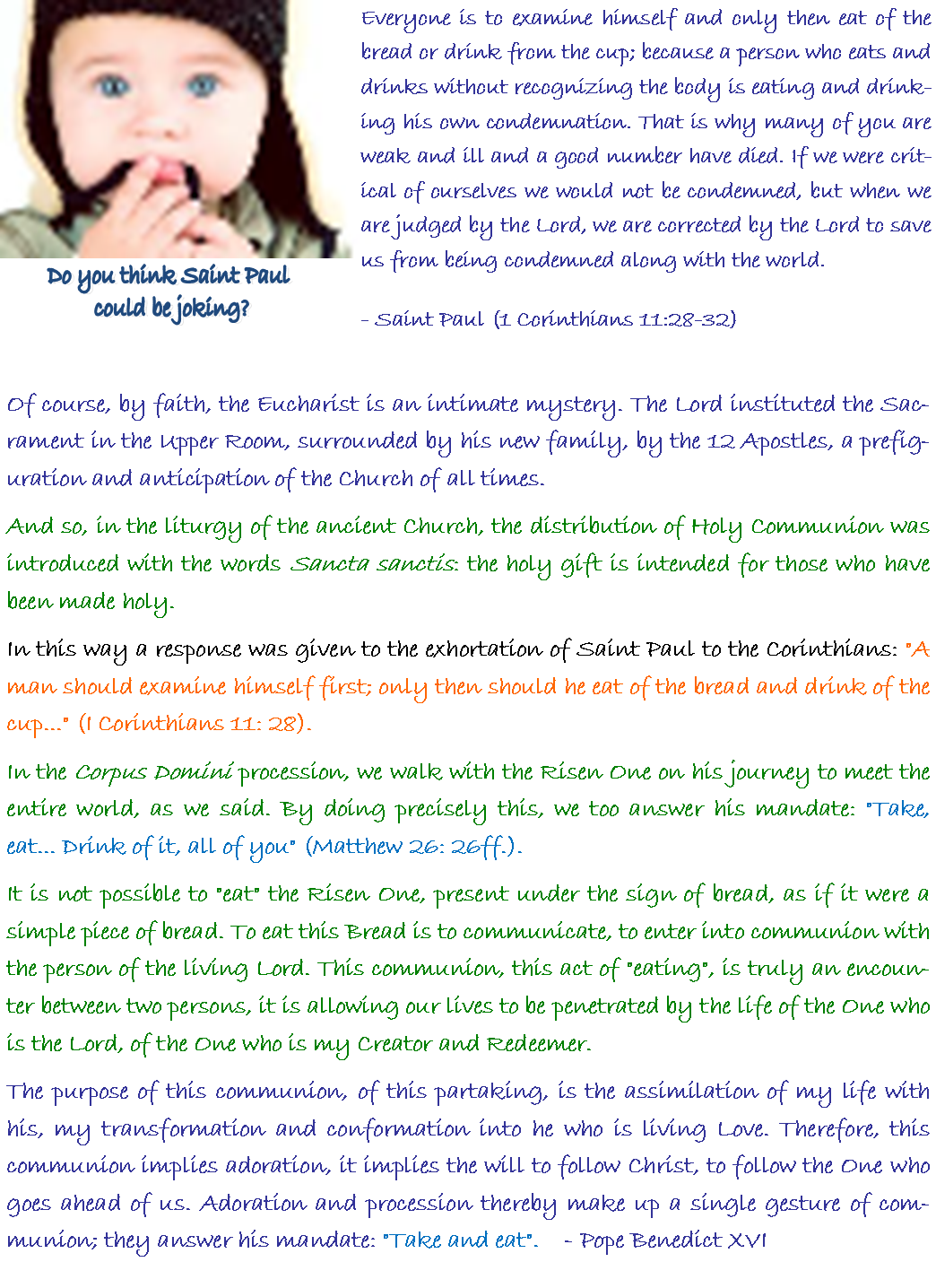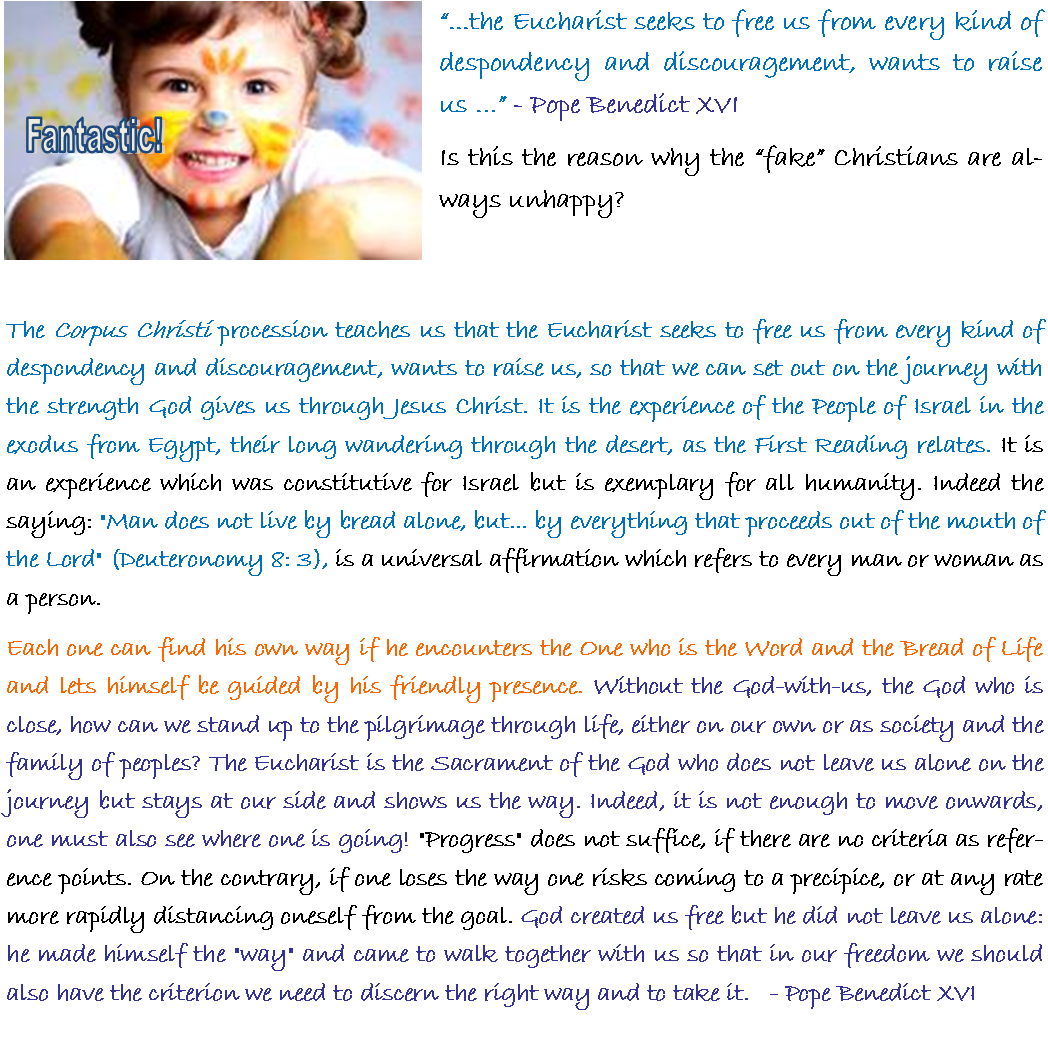|
201 |

|
The true purpose of our journey is communion with God. He himself is the house of many dwelling places (cf. John 14: 2ff.); but we can be elevated to these dwelling places only by going "towards Galilee", travelling on the pathways of the world, taking the Gospel to all nations, carrying the gift of his love to the men and women of all times.
Therefore, the journey of the Apostles extends to the "ends of the earth" (cf. Acts 1: 6ff.). In this way, Saints Peter and Paul went all the way to Rome, a city that at that time was the centre of the known world, the true caput mundi.
The Holy Thursday procession accompanies Jesus in his solitude towards the via crucis. The Corpus Domini procession responds instead in a symbolic way to the mandate of the Risen One: I go before you to Galilee. Go to the extreme ends of the world, take the Gospel to the world.
Of course, by faith, the Eucharist is an intimate mystery. The Lord instituted the Sacrament in the Upper Room, surrounded by his new family, by the 12 Apostles, a prefiguration and anticipation of the Church of all times.
And so, in the liturgy of the ancient Church, the distribution of Holy Communion was introduced with the words Sancta sanctis: the holy gift is intended for those who have been made holy. In this way a response was given to the exhortation of Saint Paul to the Corinthians: "A man should examine himself first; only then should he eat of the bread and drink of the cup..." (I Corinthians 11: 28).
Nevertheless, from this intimacy that is a most personal gift of the Lord, the strength of the Sacrament of the Eucharist goes above and beyond the walls of our Churches. In this Sacrament, the Lord is always journeying to meet the world. This universal aspect of the Eucharistic presence becomes evident in today's festive procession.
We bring Christ, present under the sign of bread, onto the streets of our city. We entrust these streets, these homes, our daily life, to his goodness. May our streets be streets of Jesus! May our houses be homes for him and with him! May our life of every day be penetrated by his presence. With this gesture, let us place under his eyes the sufferings of the sick, the solitude of young people and the elderly, temptations, fears - our entire life. The procession represents an immense and public blessing for our city: Christ is, in person, the divine Blessing for the world. May the ray of his blessing extend to us all!
In the Corpus Domini procession, we walk with the Risen One on his journey to meet the entire world, as we said. By doing precisely this, we too answer his mandate: "Take, eat... Drink of it, all of you" (Matthew 26: 26ff.).
It is not possible to "eat" the Risen One, present under the sign of bread, as if it were a simple piece of bread. To eat this Bread is to communicate, to enter into communion with the person of the living Lord. This communion, this act of "eating", is truly an encounter between two persons, it is allowing our lives to be penetrated by the life of the One who is the Lord, of the One who is my Creator and Redeemer.
The purpose of this communion, of this partaking, is the assimilation of my life with his, my transformation and conformation into he who is living Love. Therefore, this communion implies adoration, it implies the will to follow Christ, to follow the One who goes ahead of us. Adoration and procession thereby make up a single gesture of communion; they answer his mandate: "Take and eat".
Our procession finishes in front of the Basilica of St Mary Major in the encounter with Our Lady, called by the dear Pope John Paul II, "Woman of the Eucharist". Mary, Mother of the Lord, truly teaches us what entering into communion with Christ is: Mary offered her own flesh, her own blood to Jesus and became a living tent of the Word, allowing herself to be penetrated by his presence in body and spirit.
Let us pray to her, our holy Mother, so that she may help us to open our entire being, always more, to Christ's presence; so that she may help us to follow him faithfully, day after day, on the streets of our life. Amen.
HOLY MASS AND EUCHARISTIC PROCESSION HOMILY OF HIS HOLINESS BENEDICT XVI Square in front of the Basilica of Saint John Lateran
Dear Brothers and Sisters,
After the strong season of the liturgical year which, focusing on Easter spreads over three months - first the 40 days of Lent, then the 50 days of Eastertide -, the liturgy has us celebrate three Feasts which instead have a "synthetic" character: the Most Holy Trinity, then Corpus Christi, and lastly, the Sacred Heart of Jesus. What is the precise significance of today's Solemnity, of the Body and Blood of Christ? The answer is given to us in the fundamental actions of this celebration we are carrying out: first of all we gather around the altar of the Lord, to be together in his presence; secondly, there will be the procession, that is walking with the Lord; and lastly, kneeling before the Lord, adoration, which already begins in the Mass and accompanies the entire procession but culminates in the final moment of the Eucharistic Blessing when we all prostrate ourselves before the One who stooped down to us and gave his life for us. Let us reflect briefly on these three attitudes, so that they may truly be an expression of our faith and our life.
The first action, therefore, is to gather together in the Lord's presence. This is what in former times was called "statio". Let us imagine for a moment that in the whole of Rome there were only this one altar and that all the city's Christians were invited to gather here to celebrate the Saviour who died and was raised. This gives us an idea of what the Eucharistic celebration must have been like at the origins, in Rome and in many other cities that the Gospel message had reached. In every particular Church there was only one Bishop and around him, around the Eucharist that he celebrated, a community was formed, one, because one was the blessed Cup and one was the Bread broken, as we heard in the Apostle Paul's words in the Second Reading (cf. I Corinthians 10: 16-17). That other famous Pauline expression comes to mind: "There is neither Jew nor Greek, there is neither slave nor free, there is neither male nor female; for you are all one in Christ Jesus" (Galatians 3: 28). "You are all one"! In these words the truth and power of the Christian revolution is heard, the most profound revolution of human history, which was experienced precisely around the Eucharist: here people of different age groups, sex, social background, and political ideas gather together in the Lord's presence. The Eucharist can never be a private event, reserved for people chosen through affinity or friendship. The Eucharist is a public devotion that has nothing esoteric or exclusive about it. Here too, this evening, we did not choose to meet one another, we came and find ourselves next to one another, brought together by faith and called to become one body, sharing the one Bread which is Christ. We are united over and above our differences of nationality, profession, social class, political ideas: we open ourselves to one another to become one in him. This has been a characteristic of Christianity from the outset, visibly fulfilled around the Eucharist, and it is always necessary to be alert to ensure that the recurring temptations of particularism, even if with good intentions, do not go in the opposite direction. Therefore Corpus Christi reminds us first of all of this: that being Christian means coming together from all parts of the world to be in the presence of the one Lord and to become one with him and in him. |

|
The second constitutive aspect is walking with the Lord. This is the reality manifested by the procession that we shall experience together after Holy Mass, almost as if it were naturally prolonged by moving behind the One who is the Way, the Journey. With the gift of himself in the Eucharist the Lord Jesus sets us free from our "paralyses", he helps us up and enables us to "proceed ", that is, he makes us take a step ahead and then another step, and thus sets us going with the power of the Bread of Life. As happened to the Prophet Elijah who had sought refuge in the wilderness for fear of his enemies and had made up his mind to let himself die (cf. I Kings 19: 1-4). But God awoke him from sleep and caused him to find beside him a freshly baked loaf: "Arise and eat", the angel said, "else the journey will be too great for you" (I Kings 19: 5,7). The Corpus Christi procession teaches us that the Eucharist seeks to free us from every kind of despondency and discouragement, wants to raise us, so that we can set out on the journey with the strength God gives us through Jesus Christ. It is the experience of the People of Israel in the exodus from Egypt, their long wandering through the desert, as the First Reading relates. It is an experience which was constitutive for Israel but is exemplary for all humanity. Indeed the saying: "Man does not live by bread alone, but... by everything that proceeds out of the mouth of the Lord" (Deuteronomy 8: 3), is a universal affirmation which refers to every man or woman as a person. Each one can find his own way if he encounters the One who is the Word and the Bread of Life and lets himself be guided by his friendly presence. Without the God-with-us, the God who is close, how can we stand up to the pilgrimage through life, either on our own or as society and the family of peoples? The Eucharist is the Sacrament of the God who does not leave us alone on the journey but stays at our side and shows us the way. Indeed, it is not enough to move onwards, one must also see where one is going! "Progress" does not suffice, if there are no criteria as reference points. On the contrary, if one loses the way one risks coming to a precipice, or at any rate more rapidly distancing oneself from the goal. God created us free but he did not leave us alone: he made himself the "way" and came to walk together with us so that in our freedom we should also have the criterion we need to discern the right way and to take it.
Continue next page
6 July 2014 |